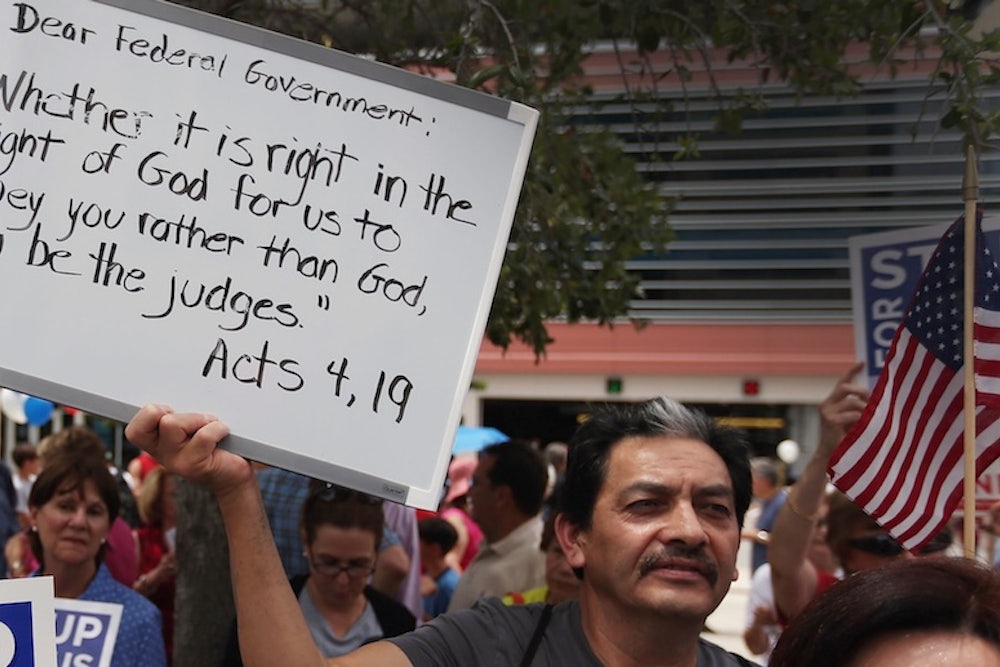The next big front in the gay rights debate is opponents’ push for “religious freedom laws”—laws that would allow individuals or businesses to turn away LGBT clients, as long as they cite religious objections to homosexuality. The proposals (which Eric Sasson, writing in The New Republic, has called "the new stand-your-ground laws") are a backlash to a string of recent court decisions, all of which sided with same-sex couples over proprietors in the wedding industry who had refused to serve them. And “religious rights” proponents have made some headway. The Arizona legislature just passed such a bill, and lawmakers are debating them in at least a half-dozen other states.
None of the proposals have become law yet, and their political prospects are uncertain. Already, sponsors who put forth such measures in Idaho and Tennessee have withdrawn them following public outcry that they were sanctioning discrimination. And in Kansas and South Dakota, proposals failed to clear supermajority-Republican legislatures for the same reason. (The Washington Post’s Jaime Fuller has a rundown here.) In Arizona, Brewer is considered likely to veto the bill on her desk. But suppose she lets the measure take effect—or that similar bills become law in other states. Would they survive the inevitable court challenges? Legal experts I consulted said the answer depends on the specific wording the lawmakers chose—and, quite possibly, on the Supreme Court’s ruling in a pair of unrelated cases, over the Affordable Care Act’s contraception mandate, later this year.
Roughly speaking, the experts said, these bills fall into two categories. One consists of proposals that mention same-sex couples, or the act of marriage, explicitly. Examples of this approach include the measure that died last week in the Kansas state senate, which sponsors called “an act concerning religious freedoms with respect to marriage.” The name of a similar proposal in South Dakota was “An Act to protect the citizens and businesses of South Dakota regarding speech pertaining to views on sexual orientation and to provide for the defense of such citizens and businesses.” Would-be measures in Oregon, and Tennessee had similar taglines.
And those words have consequences, the experts say. The specificity—singling out same-sex couples and, in some cases, the act of marriage—is just begging for judicial scrutiny. “Those, to me, seem very susceptible to a challenge under the Equal Protection Clause,” said Douglas NeJaime, a professor at the University of California, Irvine, School of Law and an expert in constitutional and sexuality law. NeJaime said that a series of recent Supreme Court precedents, including the 2013 decision striking down the federal Defense of Marriage Act, “make clear singling out gay and lesbian people is not going to be acceptable for equal protection purposes."
The other group of proposals consists of bills without that legally toxic language. The text of the Arizona bill, for example, never mentions gays or same-sex marriage explicitly. It simply broadens the reach of the state’s pre-existing religious freedom law. As Dana Liebelson has written at Mother Jones, most states already have some sort of religious freedom act on the books, but courts have consistently ruled against individuals and businesses that have tried to use them as protection after denying services to LGBT customers. In response, the Arizona bill “expands the definition of exercise of religion” and “expands the definition of person to include any individual, association, partnership, corporation, church, or other business entity,” among other things. The result is designed to head off lawsuits from gay plaintiffs claiming discrimination—or to give defendants far more leverage in court.
The intent of these bills is no great mystery. Arizona’s was written by the Center for Arizona Policy, a conservative advocacy group, and the Christian legal organization Alliance Defending Freedom. Lawmakers and local reporters have confirmed that the sponsors are seeking to protect people who reject gay marriage—and were reacting to the highly-publicized case of a New Mexico photographer who refused to document a same-sex ceremony. But the text of the proposal is more subtle, potentially making it more difficult to argue this bill—or Hawaii’s, or Oklahoma’s, or Mississippi’s—runs afoul of the Equal Protection Clause.
The more viable challenge, legal experts say, would be one citing the First Amendment’s Establishment Clause, which prohibits the government from establishing a national religion or giving preference to one over another. Here’s what a challenger to the law might say, according to Sam Bagenstos, a constitutional and civil rights expert at the University of Michigan:
The argument would be that when a state creates a religious exemption to an otherwise generally applicable law, and does so in a way that shifts substantial costs of observing religious beliefs against homosexuality from the business owners who hold those beliefs to the customers who do not, that it is impermissibly favoring religion.
The catch here is that the argument rises or falls depending on the Supreme Court’s interpretation of the Establishment Clause. And that interpretation may be in flux. The Court has before it a series of cases that raise similar questions about the boundaries and definition of religious rights, albeit in a different context: Obamacare’s requirement that businesses provide employee insurance, including contraception coverage. In those cases (explained here by Sarah Kliff at The Washington Post), a pair of businesses with religious owners is claiming they should not have to provide birth control coverage to employees, because birth control violates their beliefs. “The court may duck the issue,” Bagenstos told me. But it’s also possible that the Court will use those cases to require greater deference to the religious beliefs of business owners. As this spate of anti-gay bills shows, such a decision would have large civil rights implications for anyone who might take a job at a company, or seek its services, without sharing the owner’s religious views.
